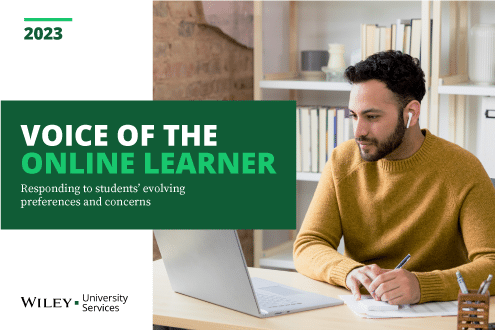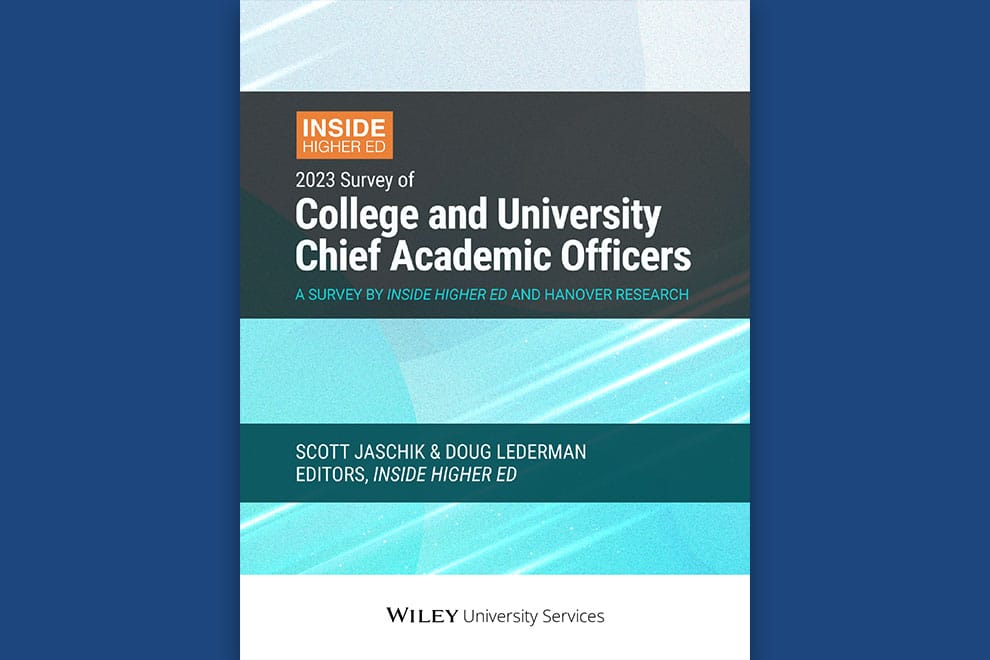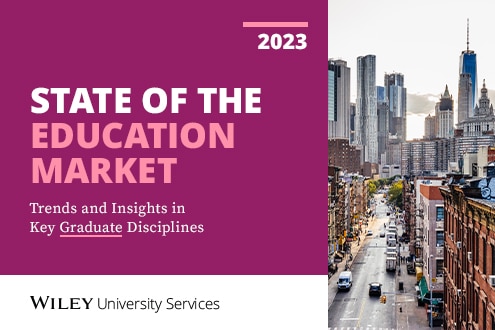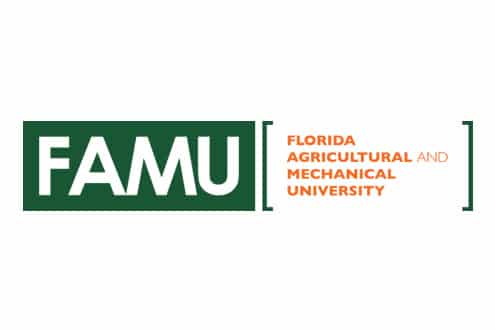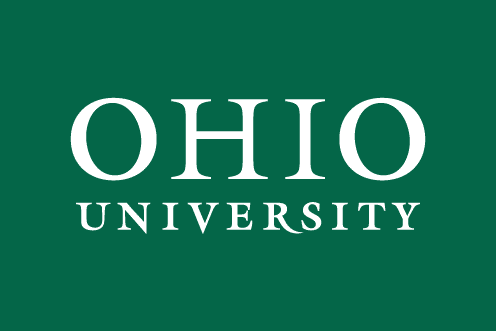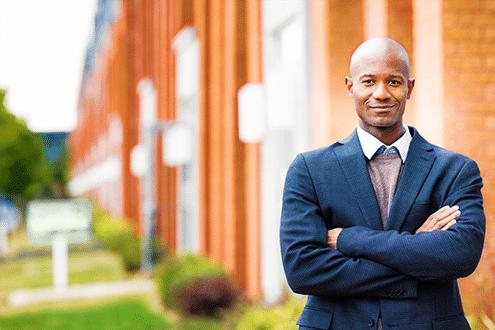Speaker 1:
You’re listening to An Educated Guest, a podcast that brings together great minds in higher ed to delve deeper into the innovations and trends guiding the future of education and careers. Hosted by the Executive Vice President and GM of Wiley University Services and Talent Development, Todd Zipper.
Todd Zipper:
Hello, I am Todd Zipper, host of An Educated Guest. On today’s show, I speak with Dr. Gregory Fowler, president of the University of Maryland Global Campus, the largest public online university in the US with courses offered online and in more than 20 countries and territories worldwide. Dr. Fowler is a nationally recognized scholar and leader in developing innovative learning models and experiences for adult and non-traditional learner populations. Prior to UMGC, he served on the leadership teams of Southern New Hampshire University Global Campus and Western Governor’s University. While president of SNHU, he led efforts to develop competency based online and hybrid programs that respond to the rapidly changing demands of the workforce and global communities, including disadvantaged students in Los Angeles, refugees in Africa and the Middle East, and learners in Mexico and Columbia. The key takeaways from our conversation today, first, what’s led UMGC to become number one college serving transfer students. Second, how the university is experimenting with a metaverse to help learners develop skills. Third, how new developments with AI demand that we think about equitable access to education. Fourth, how UMGC approaches career relevant education as a stackable experience. Fifth, the importance of understanding learner dispositions in addition to their knowledge, skills and abilities. And lastly, how transforming learners’ lives hinges on validating and explaining their skills. Hi, Greg, and thank you for joining me today on An Educated Guest.
Gregory Fowler:
Thanks for the opportunity. Looking forward to it.
Todd Zipper:
I want to dig into the history of the University of Maryland Global Campus or UMGC for short, but before we do that, I really want to talk about your history and where your background was and what really led you to coming to UMGC two years ago.
Gregory Fowler:
My background started right after. I used to start my CV with my college degree being granted, but I think I’m going to go back a little bit ’cause I will, in hindsight, take a look at my first real job that taught me a lot about user experience was working at Six Flags over Georgia. And learning how to deal with guests and learning what you anticipate or believe when you lay out a plan for how people are going to move through a park or move through a learning experience now is not necessarily the way things are going to go. I was there for a number of years running roller coasters, which is still a passion of mine, and when I graduated from college, I moved here to Washington DC and took up a job with the National Endowment for the Humanities as first the outreach specialist, which was very much focused on underserved populations and how we reach out to them, how we get them to work with the government on grants and other activities, tell their stories.
NEH does a lot of work that’s very much around museums and archives and various types of shows. You may know The Baseball by Ken Burns or the Civil War.
Todd Zipper:
Of course.
Gregory Fowler:
Those were funded by NEH, for example, or Mark Twain was another one. I had that job for about six years and got to see a lot of the US and meet a lot of various populations and understand their stories as a result of that. And then moved into media relations during my last couple of years there before I took a job for a while at the Penn State Campus in Erie, Pennsylvania. And while I was there, I got my first Fulbright, and my first Fulbright took me to Berlin during the years after the wall came down, but during the time when they were trying to figure out how they were going to reunify the country and ultimately how the EU was going to play out. And as you may know with the EU, there are many different definitions and there are different parts and one of the things they were trying to figure out is how do you take all these countries that have different educational programs and create a single degree or create a standard by which you can operate?
That taught me a lot about how you figure out quality education, what those standards look like. Came back from there with a whole new fire in my belly about higher education and measurement and got offered a job at a small place at the time in 2005 called Western Governor’s University that had about 3,000 students and 500 graduates and stayed there for a number of years working on competency based education, building out various types of things. Took a job then for a year we had a college called Hesler College, which was part of the Kaplan Family.
Todd Zipper:
Yes.
Gregory Fowler:
Stayed there but then realized that wasn’t quite what I wanted to do and SNHU at the time, this is 2011, I believe, was just getting to the point where the online side, SNHU, by the way has a residential New England campus that’s been around since the 1930s, but the on ground side was running a lot of the things that had been the online until it just became too big and scaled to do. And so they asked me if I’d come in and help build out the academic side of the house and I started as chief academic officer there and eventually became global campus president as we begin to take on all different types of programs. And then during the pandemic, got the offer of what I considered the offer of a lifetime to come work at UMGC. Have been enjoying every minute of it since then. That’s how I got here.
Todd Zipper:
That’s incredible journey. And we share a little bit of that Kaplan alumni base because I was there for a few years. We might have overlapped a little bit. You have worked at three of the four, which are often quoted as the mega nonprofits. I’m not sure who invented that term, which are the nonprofits that have really pioneered, in a lot of cases, adult and online education, ASU, SNHU, WGU, and UMGC. And so I’d love to maybe start to shift the focus to UMGC where you are now and you have probably one of the unique vantage points to really understand what it’s like to take, in many cases, even ASU where much smaller institutions and create something much bigger with them. How do you think about what is a mega nonprofit and also how is UMGC differentiating itself from the others in the group?
Gregory Fowler:
And I can’t be absolutely sure about this, but I think the first time I heard Mega University was from Goldie Bloomingstick of The Chronicle of Higher Education and I think it was during my time at SNHU. I’m not totally sure if that’s the first time. I know she used it, I don’t know if she coined it, but it was certainly the first time I really saw it was in The Chronicle during my time at SNHU. And it’s like, that’s an interesting phrase. And I wasn’t quite sure if it was a positive or a negative [inaudible 00:06:34]. The funny thing is that when I look at all of the large universities, they all have unique stories and I tell people that they aren’t all the same. In fact, they all have very unique pathways that they came about.
As you know, Western Governor’s started off from the very beginning, this was what I think 95 or so when Roy Roamer of Colorado, Mike Levitt of Utah said, well, we need to create a model that’s competency based, skills based and it’s not going to have classes, but it’s going to have rapid ability to assess and determine whether or not people have gotten those skills. And they built up that model. That is still the model at WGU, but intentional, started out as a competency based thing has grown around the country in some wonderful ways. Bob Mendahal the time and now Scott Polzer continue to do great things there, but that’s one very unique model. In fact, I think WGU is probably the only institution at scale that’s done that. That’s a very different model than say Southern New Hampshire University, which started off as a residential campus and then built out over a period of time what has now become one of the largest online schools in the country.
But it is a very different model. WGU has competencies and some very agile ways of doing it. SNHU, you’re going to be taking classes for most of the types of experiences, they now have a CBE model as well, this direct assessment. Its growth has really been primarily in that build a course type thing for the direct to consumer market. That’s different than UMGC, which started off as 1945, 47, World War II ends. Service members are coming home and when service members came home, they were trying to figure out how are we going to get them educated. We weren’t certainly online at the beginning. In fact, online didn’t start for us until 1983, 84 when the Berlin Wall came down and a lot of the students who were over in Europe and other places were leaving.
We had to come up with a business model that said, hey, we’re going to try this online thing. And we still now do hybrid experiences around the world and do these online experiences as well, but all three are very different and still serve different models. We learn from each other, but I see us all as very different from each other. With UMGC, being a global institution means about 55% of our population comes from the military. A lot of the work that you see, the 200 locations we have around the globe tend to be near military bases if not on military bases, and tend to be tied to contracts with the military at least at their base. Again, that’s about 55% of our population. And we grow the other pieces from that sort of core area that we start out in. And what I’ve learned over time as a result is just how complex the US military can be and all the work that goes into trying to serve education centers around the globe as a result, and responding to that world events as a result of that.
Todd Zipper:
That’s a great overview. You mentioned a couple terms, direct assessment, CBE or competency based education and then kind of traditional sort of credit-based learning. Could you give us a little bit of a snapshot of what you mean by those things and sort of like you mentioned, CBE seems like such a promising, I wouldn’t call it new way because it’s decades in the making here, but maybe you could sort of reflect on that a little bit and help us understand the market a little better.
Gregory Fowler:
Sure. And when we talk about competency based, at least as DOE responds to it, you’re talking about either a direct assessment model or what they call a course based model. What’s the structure in which you’re operating and is that competency that you are trying to demonstrate going to be something that people can go directly into or is it something that you have various types of learning experiences attached to? For a place like WGU when they’re dealing with competency based education, they have a subscription model. It’s a six-month term, and you can go into this and you can move through these various assessments pretty quickly, but it is still built around a sort of structure, of course. They wouldn’t call it courses in the traditional sense, but if you were looking at the transcripts and things, you see something that looked very much like a relatively normal transcript for the types of assessments and the awarding of credit that goes with that.
That’s a different model than say the model that was the direct assessment model that SNHU deploys certainly here in the states and even in some places overseas in Africa, and I believe a couple of other countries where you have a different type of direct tie in to the assessment itself that you’re trying to work with. Not necessarily tied to a typical course model, but it is, can you write this paper in this type of way as opposed to when you finish this particular type of assessment, you will get three credits of credit in a typical type of way. Yes, there are a lot of things I love about competency-based assessments. One of them is, of course, the work that’s focused on skills and the abilities you’re supposed to have and clear definitions that people who are going into those should be able to see.
There are challenges though. If you’re talking about a competency-based model, a competency-based model works if you’ve already got competency, but if you don’t, then you’ve got to figure out a model that helps someone gain those competencies. And that can be, in some ways, even more challenging than trying do a traditional course. Not always, but it’s certainly one of the things you have to wrestle your way through, which is something that both of those schools have had to work with at different times. It is a model that I like and I think we’ve learned a lot from it when it comes to clearly tagging and defining what skills we believe people are getting from certain types of experiences and how to accurately assess whether or not they have those skills. But I think each of those models has some opportunities and challenges that get associated with it.
Todd Zipper:
Yeah. It seems so intuitive focusing on mastery of competencies and a course is essentially a collection of skills or competencies and hopefully we’ll continue to move in the right direction of outcomes and that’s what that seems to be focused on. I noticed that you all have won a lot of awards in various areas that really resonate. One was around the most transfer students, and that’s a really interesting topic I’d love to jump into. Another one was named one of the top five online bachelor degrees around ROI. These concepts are really resonating with me. Let’s talk about transfer students here. You’re the largest out there doing this work. Why is this such a big challenge or opportunity in the market where so many people are transferring from one school to another? It’s often difficult, they often can’t take their credits from one school to the next school. We have so many, I think the numbers well above 30 million, individuals that have what’s called some college, but no credential coming from that. I mean, can you kind of talk about that a little bit and the work that UMGC is doing?
Gregory Fowler:
It actually dovetails very much to that conversation piece that we were just having a moment ago, which is around can you clearly define what knowledge, skills, abilities, dispositions the person who’s taking the experience is going to have at the end of the experience that they didn’t have at the beginning. If you can’t do that, then it becomes a lot harder to talk about skills and the acquisition of skills and how those skills transfer or how you’re identifying them. When you’re talking transfer credits, in many cases what you’ve got is one institution saying, I either will or will not take your credits for this type of thing because I believe that ours is so different that it does not equal the same thing. And then when you try to dive into that a little bit more and dig into it, it’s like, so what about your intro to psych course is different from this intro to psych course that’s different from someone else’s in a way that justifies saying the student needs to basically take the entire experience and pay for it over again.
That’s a really hard question for a lot of universities to answer when you really sort of dive into that question. And a lot of it goes to, well, we’re a unique institution. Our faculty want to see these types of things. But in the end I go back to either the person has the skillset or they don’t. We’re able to say, fundamentally they have enough of these skills and abilities that we can build on. And we’ve tried to build a model that says, yes, it’s not going to necessarily be exactly the same thing, but are those things meritorious of these students having to go do it all over again? And if not, how do we give them the additional pieces of the experience or the skills that they need without having to have them start over again? I had a good conversation a couple of weeks ago with one school who was asking me to talk to them about student centricity and how do they convince more people that they are student centric.
And I said, well, that depends. I mean, are you really student centric or are you just trying to tell people that you are? Because if I take a look at your actions and I take a look at this and say, is this really focused on what’s best and right for the student, is the answer yes? They seem to be a bit perplexed about trying to answer that because it’s really hard to dive into that without saying, I’m looking at this from the student’s vantage point and then understand how and why some of the things that happen at institutions do happen. Why this policy, why this exclusion, why do we place such value on keeping people out rather than trying to allow them in and working with them? In many ways, education continues to be the place where privilege is often privileged as opposed to trying to say, how do we celebrate those people who have the least likelihood of succeeding and did so anyway, which is one of the reasons I love UMGC so much is when I talk on a regular basis to people who will tell me it took me 30, 40, 50 years to get my degree.
When I go to some of the military bases and they tell me, I knew that I was going to have to stop in and step out because of getting deployed or moved around the globe. And so I knew it was going to take me 10 years to get my cyber security degree, and yet here I am completing it. Then it feels like this is the human story to be celebrated. Not that we should take away from the other functions of a university. There are lots of important things that higher education does. Certainly we need new knowledge, certainly we need to train up the next generation of educators, certainly we need to have many of the schools like HBCUs and tribal institutions and others that are going to help solve some of the other problems that prevent people from learning. But I think the biggest thing that we do is make education empower the lives of the people who are going to use that to chan transform not only themselves, but their families and the communities in which they live. That’s really, I think, the biggest, biggest opportunity.
Todd Zipper:
You mentioned cybersecurity, and I know I’ve read that UMGC is one of the largest providers of degrees, certificates in that area. How do you all think about content and curriculum and the programming that you offer the market? Obviously there’s a military centricity that has to be there and cybersecurity is so important. Have you done anything over the last couple years to evolve the programming to be as market relevant as possible?
Gregory Fowler:
Oh, absolutely. One of the big things we did, and I’m not going to remember what the acronym stands for, and I’m sure my College of Cyber and IT is going to be very mad at me, but we last year launched, for example, a Mars platform, which is an environment that allows us to immerse students in an experience that gives them new opportunities to try things that are relevant in modern times to cybersecurity and that we can tweak and make different things happen and to see how the student’s going to perform. That’s going to be, I think, a big thing for us as we continue to move forward. And another one of course you may have seen in the last year, so that we immersed ourselves in the metaversity and this conversation around things that when I first heard, I immediately went back to this concept, you may or may not remember. There was, I think this would’ve been maybe 30 years ago, something called Second Life.
Todd Zipper:
Yes.
Gregory Fowler:
And it was the early version of being able to fly around this sort of virtual space. But now we’ve actually moved far beyond that into spaces that allow for social interaction, that allows for immersion into different types of experiences. The version that we have even has an office that looks far better than mine does. I mean I love my office, but the one they have in the virtual spaces is very different. How do we take those ecosystems and create opportunities for people to demonstrate skillsets? And I go back again to our conversation about competencies and things. If you’re trying to learn to drive a car or anything where you are ultimately going to be held truly responsible for something big, ultimately at some point you’ve got to be able to perform. If you’re going to be a teacher, at some point you have to do student teaching.
If you’re going to be a pilot, at some point you have to get in a simulation. We can talk about driving a car all you want, but at some point before you get your license, most of us hopefully had to get behind the wheel and actually demonstrate to someone that we could do it. This space allows us to create scenarios and experiences that allows to see how people respond and base our understanding of whether or not they’re competent upon those responses in a way that sounds very much like something else that you may know something about, game design and gamification. When I was younger, I used to love this game. It’s been out for a while now on Xbox called Fable. I really loved the game, but one of the things I realized when I was playing was just how much learning happens incidentally, how they’re scoring it behind the scenes and how they’re teaching you various things without you even realizing that you’re actually learning in the process.
The movie example I always use is that Karate Kid example that you probably heard before about at some point, Daniel La Russo’s learning karate, even though he’s waxing on waxing off cars. They still do that in Cobra Kai, by the way, which is the new version of this story. That’s what I think’s really important about the learning experiences that we’re putting out there in cyber is how do we continue to update them, how do we create new environments and new ecosystems that present new challenges in the same way that if you were trying to be on a plane, my best friend’s a pilot, he doesn’t know when he gets in that simulator what scenario they’re going to throw at him. His job is to be prepared for it and demonstrate his skillset and competency in it. We can do a lot of that work now in the virtual space and see how people are going to respond and whether or not they truly are competent in the work.
Todd Zipper:
You’ve thrown out a couple trends and whether it was the Metaverse, metaversity, even the Metaverse, which has been the last year or so and higher eds kind of, it seems like the last decade there, we’ve just been bombarded by things that could be hype, could be real, could be somewhere in between the MOOCs that came around now 10 years ago, maybe even longer, which certainly are still here to stay, but certainly didn’t disrupt higher education as many people predicted around cost and affordability, that area of things. There’s another huge trend that’s out there that’s not just impacting higher ed but impacting the world. And that’s on these large language models, Chat GPT is the name that everybody is accessing now and Bing the search engine’s trying to use it. I’m sure you guys are scrambling. Are any thoughts here around sort of hype noise versus signal, around using AI, using intelligence to sort of advance learning, right? And obviously there’s the dark side of this stuff that people quickly went to around this could be how people write their term papers now. The cheating could sort of all of a sudden ramp up pretty aggressively. Any sort of initial thoughts on what’s going on out there around chat EBT and LLM.
Gregory Fowler:
Yes. Who knew that James Cameron and Skynet would actually be back in the news again so soon after when it came to the nature of self-awareness among artificial intelligence.
Todd Zipper:
Right.
Gregory Fowler:
You pointed out probably another one of those examples that I think is very interesting and was around for a period of time in true form as this is the end of the world, which was MOOCs.
Todd Zipper:
Yes.
Gregory Fowler:
And as you saw with that, and certainly with Chat GPT, you have big questions that I think higher education has to wrestle with. Now, neither of these things to this point have so transformed the world that lived up to the hype. Yes, MOOCs are still out there and we see learning experiences coming from so many different environments, whether there’s a LinkedIn or a YouTube video, even. If you’d seen it back then, everybody was like, if you aren’t on the MOOC train, then you are clearly behind the time. You may remember, I believe it was the University of Virginia’s chancellor who actually the board tried to fire her at one point ’cause they felt like she was not on the MOOC train.
Todd Zipper:
Right.
Gregory Fowler:
And of all the places in the country that probably didn’t need to be worrying about MOOC’s, UVA was probably one of the ones I put at the top of that list. Same thing’s true for Chat GPT. I think in both of these instances, higher education needs to ask a series of questions about what do we do, why do we do, what are we really trying to accomplish and how do we go about adapting to those types of things? That’s going to be true in both those instances. When I was getting my degrees, this was back in the eighties and nineties, you may remember something called card catalogs.
Todd Zipper:
Absolutely.
Gregory Fowler:
And these archival stacks and things you had to wonder through and microfiche and microfilm. And the problem back then was getting access to information. Education was defined as your ability to go into those stacks, get the information and then create something new. Access to information is no longer the standard by which we operate. And the same thing, I think, is going to be true as we begin to evaluate what are we really trying to do with things like Chat GPT. Certainly here on the technology side, we’re talking about it in things like bots and student activities and student affairs and whether it can help with various types of student services. But it also brings into mind this question of how might you use this to actually amplify students’ abilities. We certainly are talking about this in terms of equity. Does this allow for different populations to participate in the conversation in ways that they wouldn’t before?
I don’t tend to buy into either of the Goldilocks principles of it’s too hot or too cold or it’s the end of the world or is the panacea for all of these things. Very few things in human history have been eureka moments. Most of them tend to be things for this two steps forward, half step back type of progress. And I suspect that when we get to Chat GPT, I think you’re even seeing even in the last couple of weeks questions being raised about what its real capabilities are, what are the limitations, what’s the reality of what it can do and can’t do, all of these various types of things. And I think we’ll have to wrestle with them. I think we will have to ultimately wrestle with the big fact about technology. I’m a huge Mark Twain fan and one of his big works was a Connecticut yanking King Arthur’s court, which you may remember a kid from the 19th century goes back to the sixth century, wants to try to modernize the world.
And what I’ve said to people about this is the problem with technology is that it grows exponentially. The challenge for human beings is that we grow one step at a time. And we often find ourselves in these situations where the technology’s able to do things and we have to ask the question not of can we, but should we? If we should, what do those things look like? You may remember that, I remember the first time they clone, I think it was a sheep, Dolly.
Todd Zipper:
Yes. Yeah. Yes.
Gregory Fowler:
And then the question became should we clone sheep and what does that actually mean? People are like, well this is the end of the world again about technology. I think we have to approach what we are trying to do in higher education with a certain amount of humility and a certain amount of patience about what’s real and what’s not, what’s possible with that. And we have to then be willing to go back to that question I asked a little while ago about how do we know we really do what we say we do? And for many years when we talk about competency based education, one of the things we talked about at WGU was if the assessment is always writing a paper, are we really assessing skillsets, or are we assessing writing? But if it’s about they can do the task but they can’t write well, then what’s the competency we’re trying to measure here? I think this is one of the things we’re going to have to wrestle with as well when it comes to things like Chat GPT. One of my former colleagues said at one point if they can find the answer on Google to the question you’re asking on the test, then maybe you should ask why you’re asking that question and not whether or not they should be going to Google as part of the conversation.
Todd Zipper:
I like that. I want to jump back to one of the things you were talking about earlier about learner centricity. And I know that that’s a key part of your strategy, ensuring affordable access is part of that. We have this concept at Wiley we call the iron triangle of affordability, accessibility and outcomes. That’s one of the reasons why I reached out to you because I know UMGC is sort of focused on the center of that bullseye. I’d love for you to unpack for us, let’s just start with the affordability aspect of things. How do you think about that when you’re approaching the cost of the education? Obviously trying to also get access to as many people that need the education that UMGC offers.
Gregory Fowler:
We certainly, and it’s one of the good opportunities to be thinking about what we can do as a state university system with some support from the state. But it is a continuing challenge that we have to work with, particularly as you’re talking about innovation. And I’m sitting here, we were just talking a minute ago about the metaversity. My Oculus set is over here sitting right behind me. When we started working with it, it’s like yes, there are a lot of things that the virtual reality world has done. It has increased engagement we’ve seen in some of the work that we’ve done for the people who are able to get into the experience, it’s created different opportunities and ways to test and assess. That opens up new doors for accessibility on that side. But how many people can actually afford an Oculus?
Todd Zipper:
Right.
Gregory Fowler:
The minute you come up with this, you find that triangle is pulling you in one of three different directions and it’s like, I can do two of these, I can’t pull all three at the same time. And we’re trying to work our way through that through things like scholarships. A lot of the work that we do in a couple of different ways. One of my big joys is seeing, we recently partnered with one of the local high schools, Flowers High School here in Maryland and Prince George’s Community College come up with something called a 3D program. A minute ago I was talking to you about 85 year old graduates. Now I’m going to talk to you about some very, very young graduates who start with us in high school, get their diploma, get their associate’s degree and their bachelor’s degree off under $10,000 if they’re PELLL eligible, then they can actually finish this degree with no debt for themselves based upon the funding that we’ve been able to put in place for that. Had our first graduates last year, the first one’s 19 years old and is now getting ready to head off to law school.
But it really became this, how do we either compress the costs through time and through different ways to assess and increase access to some of those things in different ways as well that partner in a way that gives us new opportunities for it. We are constantly thinking of ways to actually do those types of partnerships. Another one’s going to be with a lot of the corporate partnerships that we have through companies like Guild and Ed Assist and others where we can partner with say a Target or a Hilton or JP Morgan Chase or UC Health where they will pay for the education, allowing for more students who otherwise might not be able to gain the education to do so. We are constantly looking for ways to work our way around that triangle and stretch the possibilities for it in ways that otherwise would not make opportunities available to so many of our different students.
Todd Zipper:
Yeah. I want to jump into the employer side that you just mentioned and on the website, you guys talk about career relevant education. That resonates a lot. Can you unpack that a little bit? What do you think that means?
Gregory Fowler:
You will hear in a lot of places this conversation about vocational education as opposed to liberal education and some of the other terminologies. I’m a firm believer in making sure that the experiences that we give to our students, the skills that they come out of those experiences with are things that they can utilize for the things that they come to us for. And I think that’s going to be different for different populations. And we talk about UMGC and one of the benefits of being us is that we have so many different students who come to us for different types of things. We have certainly students who are trying to change their lives, but I also have a lot of students over in places in Asian, Tokyo and Okinawa where they are college students whose parents are in the military. They’re never going to stay with us when they get back to the states because they want their residential thing.
But they come to us for a couple of experiences along the way. What we are trying to do is figure out what are you here for and how do we make sure you get that? And particularly when you’re talking about jobs, how do we make sure if you are here because you’re trying to get a new job or get a promotion at a job that we can demonstrate for you from the moment you show up, here’s how what we are doing is going to give you the skills you need for that experience. I’ve talked a lot about, in my career, the idea of education as a black box. We sort of go into it and we say to people, just trust us that you’ll come out on the other side and something magical will happen. Well that’s just not true for a lot of people. And the example I use this year now coming out of the resolution period of people who went to the gym for the first couple of months because this was going to be their year, I watched the physical trainers during that time when they come in and they’re talking about what are your goals, where are you’re trying to get to, what motivates you? And there’s a very intentionality to the experience. You’ll be able to say this stacks to this, stacks to that. And when you get to this point, you’ll have reached your goal.
We need to be able to do that same thing with education to say the experiences we’re putting you in are going to stack from here to here. You want to be an accountant, we’re going to give you this experience and it’s going to stack into this one. And by the time it’s over with, we can tell you what the skills are that an accountant should have and how you have gained those skill sets and how you should be able to talk about them. When we talk about career relevance, I want us to be able to say the experiences you’re having are relevant to where you are trying to go. And we can clearly explicitly talk to you about what that is.
Todd Zipper:
That’s great. Kind of go into the employer side of the equation. You mentioned a couple of these strategic partnerships. I believe you’re one of the preferred providers of the Amazon career choice. Perhaps you can talk about how you’re working with Amazon, right. They have hundreds of thousands of employees. They’ve got this incredible multi-billion dollar benefit they’ve basically have talked about in the market and these are captive students. In a sense for you, you’re not looking for the student, although there’s probably a marketing aspect getting into the employer, especially the larger ones. How are you thinking about offering a great product to these individuals?
Gregory Fowler:
We’ve been one of the long-term participants in that career choice program. Meaning about two years ago, they opened it up and said, okay, we want to be able to allow people to have skill sets that are going to change their lives. When they first started the program, you may recall that one of the things they were trying to do was help a lot of their starter employees gain skill sets that would allow them to then go out into the workforce.
Todd Zipper:
Correct. Yep.
Gregory Fowler:
It wasn’t necessarily a retention tool at that time, it was entry level employees will be able to gain some skills. We know they’re going to leave us in a couple of years, but for now we’re going to try to help them do that type of thing. A couple years later, the movement seemed to shift a little bit and it was no, we want to also use this as a retention tool. This isn’t just about leaving us, this is also about staying with us. And so we’ve tried to make sure we do a lot of work around what I was just saying, what are those skill sets that we are talking about? If you’re trying to hold onto these employees and you want them to gain new skills, what do those skills look like, how do we begin to build out those experiences, which things matter and which things don’t? Which pathways? You may have heard this term a lot, we talk about guided pathways. If you want all your mid-level managers to get better at dealing with diverse populations or dealing with conflict resolution, what skill sets can we stack in those ways and make sure that we’re testing in those ways to do that.
A lot of the work we are trying to do on that front end is make sure we build out those pathways and that we are aware of what’s happening to those students and their experiences. It continues to be a challenge. I will say that this is true and you’re seeing more articles written about this, which is the hard part isn’t necessarily getting students to start. The hard part is, of course, trying to make sure that once they do start, we figure out what are the challenges they’re running into because life happens. This is true and this has been true for the last 20 years of my experiences, which is the reason students don’t succeed has very little to do with whether or not they can figure out the content. It has to deal with life is happening. And for a lot of our students, we are never going to be better than their third top priority after work and after family. And so when those things begin to be challenged, how do we create an advising system, a success coaching system that allows us to continue to motivate, to get them ultimately to the place for success as they’re moving forward.
Whether it’s with Amazon, whether it’s with Guild, whether it’s with Ed Assist, these are conversations we’re having across the board that say, how do we at 10:00 at night when you put the kids to bed and you’ve got about two hours before you’ve got to go to bed ’cause you’ve got to get up at 5:00 to get those kids up again, how do I maximize that 120 minutes of your time to make sure you gain some skills that will move you forward? And how do I do so in a way that’s going to keep you engaged, which is one of the reasons why metaversity is important to help us do some of that. These are big questions that we have to answer and we go back to that topic about student centricity. I go back to the very thing we started with, which was Six Flags and being able to say, okay, we built the park and thought that if we put the roller coaster at the back of the park that everybody would started at the front and slowly go back there.
But wait a minute, everybody’s running first to the rollercoaster and working their way back. Now we got to think about where are the restrooms, where are the restaurants, where are all the shows going to be in relation to the fact that the reality is, I actually know some people when they’re building houses, they say we don’t actually build all the paths in the community ’cause we’ll see where people are going to walk and then we’ll build the paths as a result of that, because then you understand really what is the tendency and what is human behavior trying to do. We’ve got to be better about that with both the academic experiences and content creation, but also with the non-academic experiences. What’s the reality of what people are going to go through and how do we watch what’s happened to them, build pathways based upon what they’re going through as a result. That’s what it means to be student centric. I say it’s a different thing to be saying, we’re all going to be focused in on the student. Yeah, the students at the center of your vision, but that’s a very different conversation trying to say, we’re going to try to force all this stuff inward as opposed to saying, I’m going to position myself to look out and see what the student sees and create experiences based upon that notion of student centricity, which is what we are trying to do.
Todd Zipper:
Yeah. I read in one of your press releases that you guys have created this concept called case ads or knowledge, skills, abilities and dispositions. I found that really interesting because you created those around what employers need. I feel like you’ve been touching on that. Is there anything else? I mean even disposition sort of resonated. Any other thoughts there?
Gregory Fowler:
Yeah, it was funny. When I first started, I began to pick this up at WGU when we was trying to understand what are competencies. And of course you’ve got competencies and when you’re talking taxonomy and things along those lines. Either know it or you don’t know, but that’s sort of the very basic level. And then you get into what can you do with it, can you apply it in various ways? And once we started building out nursing and education programs, I began to appreciate that part of the learning experience is trying to understand, do you have the disposition to be a nurse? How can we help you gain that, or to deal with young children if you’re talking elementary education. How do we begin to be explicit about those experiences and help you gain them in different ways? And again, going back to this idea about diversity, equity, inclusion and belonging, there’s a difference between trying to say either someone has the skill or the ability and we can’t assess it because we don’t necessarily know how they are demonstrated and they don’t have it at all.
You see this a lot when you’re talking. You may remember a California achievement test. Even some of the questions you’re having with SATs, which is around these things are built for certain populations to do well and others not to do well. That doesn’t mean they don’t have the skill, it just means that the way you’re assessing it doesn’t necessarily measure it given the environment and culture in which they’re operating. We’re trying to get a better understanding of whether or not those things are present and or whether or not we can assess them. And if not, can we help you build up those skills? Particularly again, going back to disposition. It’s funny, I did see somebody once in a physical therapy program say, I just don’t like touching people. And I was like, are you sure you want to be in physical therapy? I’m sorry.
That’s not going to be a good field for you if you don’t have the disposition to do that kind of work. How do we work with those types of things as we continue to move forward is a big one. But they have to be explicit and they have to be things that not only we can tell the student, but the student can tell employers in ways that make sense to them. And if they can’t explain it, then it may be very difficult for them to get a job, even if they may have the qualifications or the ability to do so.
Todd Zipper:
I want to stick with this fascination, this dispositions here. For the last couple years in my role, we run a bunch of these personality type assessments, one of them called Disk, Everything Disk. And it’s been hugely helpful to me to learn more about myself, learn more about colleagues, and it really helps guide me in the roles that I do. Like you said, there’s certain things that come naturally, there’s certain things that don’t. Why don’t colleges do more of that work with their individuals? It’s not like a course per se, but it should be embedded into them thinking about how to go about their pathway of career. Any thoughts on that?
Gregory Fowler:
Well, I think it’s certainly true, and you’ve got Disk, you’ve got Myers-Briggs, you’ve got Caliper. You’ve got a number of tools that really try to get at the reality of how different groups of people work together and the value that each of them brings from their vantage point. You may remember the old story of the seven blind men and an elephant.
Todd Zipper:
Of course.
Gregory Fowler:
It’s like everybody’s grabbing a piece of it, but not necessarily being able to see the whole. And the value of being able to talk and collaborate is that you can probably eventually figure out you’re grabbing a leg, he’s grabbing a tail, you’ve got the trunk. Oh wait a minute, it’s an elephant. But you’re not going to be able to do that if it’s only the things that you hold. It is the most interesting and troubling thing that we often talk about diversity. We celebrate it in movies and these people who do amazing things and challenge the status quo. And yet every single piece of pressure in our lives is for us to assimilate. And we do all we can to say, yeah, I appreciate diversity as long as everybody’s like me, or if everybody does things my way. And as I’ve become a better leader, I’ve begun to appreciate that setting a vision and giving people the space to do different things will not only necessarily sometimes result in even greater success, but will also result in me learning something in a new way that I hadn’t even considered. I was sitting a couple of weeks ago with some autistic children and I was just thinking, boy, if we could really just find ways to learn from this group of children because they see the world in such a different way that it has great value.
When it comes to personality tests, when it comes to different profiles, the value of diversity, and I can tell you that I’m a very strong space on the Disk chart. I won’t tell you where, though anybody who knows me will probably say, yep, that doesn’t surprise me at all. I think we’ve got to find better ways to deal not only with just the sort of personality profiles, but just cultural differences. If anything, we’re going in the opposite direction, it feels to me, a lot of the time, which is we continue to value even less those people who see the world differently from us rather than seeing how they can help us refine the way we see the world and value something different and therefore build on it. One of the things I was talking to my team here in the office about is that I do love the fact that when I’m walking around the building, the dynamic situation of molecules bouncing into each other as I run into other people and we have random conversations, it’s what generates new ideas. And I want to make sure that we celebrate that and do more work to see that happen on college campuses and in virtual spaces as we move forward.
Todd Zipper:
Yeah. That’s so powerful. And just kind of this innovation theme that just keeps coming up here in what UMGC is doing. One thing that fascinated me probably close to 10 years ago now, I don’t know when you guys started it, was this idea of UMGC Ventures, right. A public backed university that started really a bunch of ventures, which really seemed like it was coming out of innovations that you had created and built and that you then figured out a way to commercialize. I’d love for you to talk to us about that ’cause I think you’ve had a few successes here. I think it’s a really exciting story as part of the UMGC story.
Gregory Fowler:
Yeah. Ventures is one of those things, and it was of course here long before I got here, but when I started and I continue to see it as an opportunity to do some things in ways that otherwise we couldn’t be able to do them. Being able to say, hey, we are working with all of these various populations around the globe. We are working with the military, we’re working with various direct to consumer markets. We’re working in all kinds of locations. We are having to, during the pandemic, figure out, okay, so I can’t have those face-to-face classes in Okinawa, but if I do it virtual and I take up a couple of students from Tokyo and a couple from Okinawa and a couple from Seoul and South Korea, and I create a livestream experience that allows all of them to engage, then all of a sudden I’ve got a different kind of experience and how do I learn to master that?
You’ve got all types of opportunities to be able to say, we’ve been doing all of these various things for a very long time, how do we intentionally, and you’ve heard me use that word a couple of times, take those learnings and figure out what comes next and help others in the process of doing that. And that’s really the work that I’m seeing Ventures try to do. I’m trying to make sure we use them and work with them in such a way that they help UMGC transform into what it needs to be next. But in the process, also work with a number of the schools, certainly within the system of Maryland, as you know, we are one of 12. If our HBCUs are doing some things and they want to figure out how do we do this virtual experience, great, I want Ventures to be able to go over and talk about how do we take that and how do we incorporate what they know about diversity and inclusion into experiences that we can then leverage somewhere else.
If we’re talking about any number of different types of analytics and prescriptive experiences that we are trying to have, how do we learn to do what I’m calling the doppler radar of the student experience? How do we pull together all of these various factors and say, there’s just enough stuff going on here to say there might be a storm tomorrow in the student experience. This student might be about to run into an issue or not, and how do we prepare for that? That’s a whole new level of complexity and it requires us to be able to think outside of the box about it, and at the same time, we’ve got to continue doing the work that we do around the globe. One of the things that I learned from my time at SNHU is if you really want to do creative and innovative things, putting a little bit of distance between you and the core product may be a good thing to allow you to do that.
For us, at any given time, UMGC has to be ready to adapt and move with the military. We’ve been involved in a lot of the work. My students, were very much tied to the evacuation of Afghanistan. All of a sudden I’ve got all these kids in Germany who got to step out of class for the next six weeks because they’ve got to go fly C-17’s and these types of things or I’ve got people who are trying to deal with, wait a minute, we’ve got a situation in the South China Sea. All of a sudden, my kids in Okinawa are trying to figure out, I got to disappear for a little bit and I’m going to come back. Or how do I work these things? How do we take all those lessons about agility, about student experience, about stepping in and stopping out, how do we take the experiences of having to deal with all kinds of familial issues like my spouse is going to be away for the next period of time.
I don’t know how I’m going to cope with that. Well, that’s a challenge if you’re trying to learn and you’ve got the kids there, so how do we think about those types of things? Or kids who are in high school over in Tokyo who are American citizens, but in American high school who want to start taking college classes. All of those things are what Ventures is here to help us figure out. What can we go from the 10-foot level to the 30,000-foot level and say, how do we take all that stuff and begin to leverage it to know more and to help others do some interesting things as we continue to move forward. We’ve only begun to really dive into what ventures can do for us, but I assure you it’s at the top of my list of things that I believe are going to have an impact as we continue to move forward.
Todd Zipper:
I think it’s great that you give innovation space, which it needs, because a lot of times, any big organization, it’s hard to breathe when you’ve just got to run 80,000 students or what have you. Just one other conversation before we get to our close, just because talking about the military and I often think that these individuals that come out, they have so much life experience, so many skills, and I know UMGC has pioneered so much around credit for prior learning. Can you talk a little about that? Because that’s such a big factor. We talked about so many people that can’t get through the system because it’s just too long, too cumbersome, but giving people credit for prior learning certainly would help. How do you guys think about that?
Gregory Fowler:
I think it’s both prior learning and current learning is another phrase that I’ve been using because we often use that phrase, lifelong learning.
Todd Zipper:
Right.
Gregory Fowler:
And the truth of the matter is that the vast majority of things we will learn in our lives do not happen in a classroom. We don’t learn how to get over the heartbreak of our first love by sitting there and listening to a lecture in an auditorium. We don’t learn the things about how to wrestle with people who are different from us simply by sitting and listening to a lecture about it. Life happens and you gain all those skills and the hard part is trying to find ways to truly document what those skills are. And they happen sometimes on the sports field, they may happen in a store, they may happen simply in your neighborhood. And we are trying to find different ways to do those types of things in addition to the things that people think about when they talk about prior learning assessment around things like the military.
Certainly when we are talking to various officials in the military and they’re saying, we really don’t think that somebody who’s a colonel or a corporal, if they’re going to go into a college, really needs to take that introduction to leadership class. They probably demonstrate that skill pretty readily because we’ve had to demonstrate those things as we continue to move forward. We are looking for various ways as we continue to move forward to say, can we document a formal way that assessment did happen somehow and was observed by somebody who’s qualified to have evaluated that? And if so, what kind of credit, and it may not necessarily be credit hours, but credit can we give for that as we continue to move forward, whether it’s badges or other things that allow for them to be able to say, I can demonstrate that I’ve got that skillset.
We’re certainly doing that with the military. We’re trying to find ways to do that with others. There’s been some basic work done in this with ACE and others that we’ve certainly incorporated into our work, but we’re now trying to find other ways to do that at scale. Part of the hard part about it is going back to that doppler radar image that I gave you a little while ago, is there are so many different experiences that people have and there are very few ways to really sort of aggregate all of that in some ways that will allow you to put all that data in and say it ultimately equals up to this, which is one of the reasons we’ve been in a lot of conversations with places like Google, who of course of anything know about data and algorithms and being able to do these types of things at scale. And we are having conversations with some of our other colleagues at other places to say, how do we take all that data and ultimately give people as much credit as possible for the things that they already know or could demonstrate skillset in based upon the life experiences they bring to the table.
That work will have to continue, but it’s absolutely something we are committed to as one of our top priorities.
Todd Zipper:
That’s great and it definitely will drive more of that bullseye of the iron triangle. As we look to close here, higher ed, I think we’re approaching 12 years of declines, right? In total post-secondary population, it’s a little bit different depending on how you break out the different sectors. The pandemic things were not great at all for higher education in many respects, and so a tailwind that certainly existed for online higher ed, graduate online higher ed for a decade or so, the airs out of that balloon too. Knowing that they’re sort of facing real challenges, secular challenges here, how do you think about the future? We talked a lot about the present and the past here, but are there anything in the future that you’re trying to build the university towards to protect against this sort of declining post-secondary market? Maybe we need to think about the market differently entirely. I’d love to get your thoughts on that.
Gregory Fowler:
I think that’s true on a couple of fronts and I said to a lot of my colleagues at one of my jobs before I took this, we didn’t talk about it, was as a commission for the New England Commission for Higher Education. It was where I was when we first started dealing with the pandemic and we were talking about this idea of online or remote learning. For those of us who’ve been working in this field for a while, it was a bit frustrating. I mean, it was nice to see that people were trying to have the beginnings of a conversation about it, but I said to them, what we’re talking about now is not online education. It is a risk mitigation strategy. It’s the idea of there’s a flood and I’ve got to learn to swim right now or else I’m not going to be able to keep my head above water.
That’s not going to win you any Olympic medals. That’s not designed and intentional training and the work that it takes. In the same way, what a lot of schools did during the pandemic was really, we’ve got to find a way to keep our business models and keep our learning experiences going, and so they did the best they could. I think coming out of that, what you’ve seen is a lot of them recognizing the benefits and opportunities tied to that and are trying to figure out how do we take that and not necessarily become an online institution. I don’t think that the vast majority of the institutions are trying to become online institutions, but they are saying there are elements of that we really did actually or learn from. I heard a lot of students who love the idea of being able to sit in front of a screen and have a chat going on beside one of the faculty member who’s giving their presentation where they can actually talk and discuss, stop, pause, and have conversations about things.
And I heard a number of schools say, hey, we want to be able to do that. I heard a lot of faculty members who were amazed at the fact that all of a sudden I can see in real time where my students are struggling based upon how they’re progressing through the formative assessments that they’re doing, and I can reach out to them and help them be successful. That may be a tool that they decide to keep as well. I do think that elements of that will stay in place. But as we go into the future, I think you hit very much upon something that I often talk about, which is when you talk about innovation and disruption in the ways that we are talking about it, generally things change, but they don’t necessarily change in the ways that feel like they’re the most obvious upfront.
Let me give you the best example that I can and is the one you may have heard as well me say. When we were all listening to cassette tapes back in the day, I won’t go back to eight tracks, I will stop with cassettes or LPs, what you saw was you had to buy the whole package for an LP. They eventually turned into compact disks excluding this sort of short period of time where you could buy CD singles. You had to go buy the $15.99 CD regardless of whether or not you wanted all 12 songs, you just really wanted the two good ones and everything else you just had to sort of buy as a result. And then all of a sudden Napster comes along and the industry’s going to try to kill it and they do, but you know that genie’s out of the bottle. And over time you get Spotify and Pandora and the ability to plug and play to stack that various types of experiences for various types of scenarios.
And this is where you see the music music industry being right now. And I would say that it is probably true that more people listen to more music now than ever in human history. I would say the same thing is probably true for more people watch or read news now than have ever done so in history. They just don’t read newspapers.
Todd Zipper:
Right.
Gregory Fowler:
Now, we can argue over what news is and all that kind of stuff, but there has been an increase in it. I would make the same case that more people are learning.
Todd Zipper:
Right.
Gregory Fowler:
I mean, I learn something every day. I got to go home and figure out how to hang this picture. I’m not going to go buy a book or I’m not going to go try to take a class, but I’m going to go to YouTube or I’m going to go to Google and try to figure out how to do this new thing. The learning is out there. Now, some of that learning as you know, it doesn’t need to be marketized.
Todd Zipper:
Right.
Gregory Fowler:
Please don’t [inaudible 00:54:10] every time I get a YouTube video, but what we can do is say for the places where we have value in credentialing and assessment matter, how do we do that in different ways that allow for the learner to get the skills and the credential that they need to move forward? That’s really where I think a lot of this is ultimately going, and it may not always be degrees. You’ve seen already here in the state of Maryland, Governor Westmore, but even before him, Governor Larry Hogan were saying, and you’ve seen about six or so, seven other states where they’re like, for government jobs in the state, we’re not going to require degrees anymore.
Todd Zipper:
Right.
Gregory Fowler:
It doesn’t mean they’re not going to require skills, just means they’re not going to pick that old package that was the $15.99 package and say you got to have that. Now we as educators have to figure out how are we going to create the Pandora and the Spotify. That, I think, is the interesting piece that lies before us.
Todd Zipper:
Very interesting. Before we wrap, is there anything that you want our listeners to walk away understanding from our conversation today?
Gregory Fowler:
I would say someone gave me, and I wish I had it in front of me, this will be an audio podcast, but someone gave me a wonderful ornament and it is, I don’t know if you remember the end of the Karate Kid, but it’s that little part at the end where Mr. Miyagi’s sort of looking sideways with that sort of smiling look on his face. They gave me an ornament with that on it, and the line underneath it has him smiling saying, you’ve been learning all along. And I think that’s something I want all of the listeners to do to recognize that learning happens all the time. You don’t have to wait for something formal to do that. The better we get at tagging that and the better we get at talking about that, the more likely it is that you’re going to be able to change your life. But even for people who get full degrees, if they can’t talk about it, it doesn’t matter. One of the skillsets we’ve got to be able to do is help them explain where they got those skillsets from.
In many instances, being able to do the opposite and say, I may have not gotten it from this formal way, but here’s what I’ve done. The better you’re getting at explaining and understanding where and how you’re learning, and the more you challenge yourself to do more of that, the more likely you’re going to be able to do the thing that we all talk about, which is transform your life.
Todd Zipper:
So powerful and love all these Karate Kid references. All right. I ask this of all my guests. Part of what we love about education is that we’ve all had learning champions. Who has been a learning champion for you, and how has that person helped you in your life?
Gregory Fowler:
There are two big groups of learning champs, certainly you’ve got these historical figures who we learn from. The big learners I’ve had in my life have generally been my teachers. Not necessarily the teachers that you would always think about. Now, I owe a big debt to people who saw me and recognized where there was something that could be added on. I’ll give you an example of that. My high school teacher, Geraldine West-Hudley, was very aware of the fact that I needed to probably go to a school like Morehouse. It was not because I didn’t have value in other things, it’s just that I had been in a lot of gifted classes where I’d not seen a lot of other African-American successful males. She taught me a lot about being able to see, you don’t need to go to every single HBCU, but getting an HBCU experience will be good for you.
Then you can go off and do the other things you want to do as well. That’s played a big role in my life, seeing how to improve the things that I’ve had, and I’ve tried to take that with me. The other group of learners that I’ve really learned from are sometimes the people who teach you what not to do. My mom taught me two big lessons that I really always carry with me. One of them is two ears, two eyes, one mouth for a reason. The other one was, I’ve got four older brothers and she always told me, you don’t have to repeat your brother’s mistakes. If you pay close attention to them and learn from that, you’re going to make your own mistakes, but you don’t have to repeat theirs. I’ve learned a lot in my life from trying to watch and learn as much about what not to do as what to do in the experiences that I’ve had.
Todd Zipper:
Oh, it’s so powerful. Greg, thank you so much for taking the time to speak with me today.
Gregory Fowler:
This has been wonderful. Thanks. Glad that you were able to take some time with me as well.
Todd Zipper:
Absolutely. Until next time, this has been An Educated Guest.
Speaker 1:
Thanks for joining us on today’s episode. If you like what you’re hearing, be sure to subscribe to An Educated Guest on your listening platform so you don’t miss the latest episodes. For more information on Wylie University Services, please visit universityservices.wiley.com.






